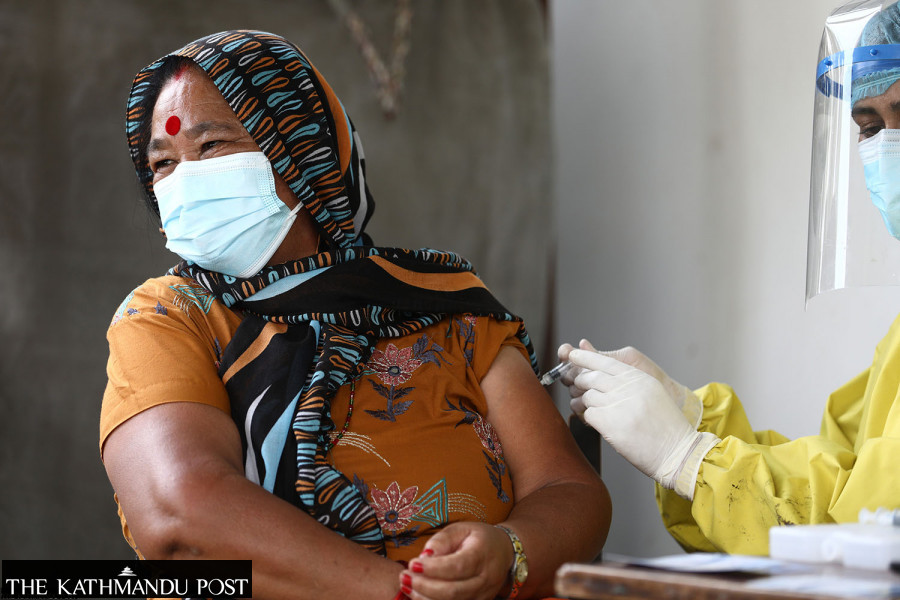Health
No Covid vaccines in stock, but officials urge all to get boosters
The Health Ministry projects a new surge in Covid cases from January-end.
Arjun Poudel
For the last one week, people seeking booster shots and second doses against Covid-19 vaccine have increased manifold at urban health clinics in Ward-1 of the Kathmandu Metropolitan City. Health workers serving in the clinic say that every day they get dozens of phone calls from the public, who are concerned about the news of risks and of another surge in infections.
“The number of people seeking the Covid vaccine has increased significantly,” said Nirmala Goshain, in-charge of an urban health clinic in Ward 1 of the metropolis. “But we don’t have doses to administer. The Department of Health Services has not supplied us with vaccine doses for the last two months.”
The Ministry of Health and Population has urged the general public to up their guard against the infection, including avoiding crowds and getting the vaccines at the earliest. The ministry said that people inoculated with their first booster shots three months ago are now eligible to take the second booster shots.
However, neither the government has the vaccine doses in stock nor have the government agencies stopped organising functions and events involving large crowds.
“We do not have any vaccine doses in stock,” said Satis Bista, chief of the Health Office Lalitpur. “The number of people seeking vaccine doses has increased of late. People did not come when we had vaccine doses, but now after cases started surging in neighbouring China and other Asian countries that people are seeking vaccination.”
Officials at the Health Ministry concede that there is a lack of vaccine doses in stock.
When asked why the ministry urged people to get inoculated at the earliest when the government does not have vaccine doses, Health Secretary Dr Roshan Pokhrel said that around 200,000 doses are in various health facilities throughout the country.
“We have asked people to get administered with the vaccine doses, if they are available in their nearby centres,” said Pokhrel. “The government has initiated a process to bring additional doses, which will arrive soon.”
Public health experts say authorities should do their best to bring in the vaccine doses at the earliest, instead of confusing the people.
“Government officials know that they don’t have vaccine doses in stock to administer and have accepted that risk of a new surge is growing,” said Dr Baburam Marasini, former director at the Epidemiology and Disease Control Division. “Officials should try to bring vaccine doses at the earliest, to lessen the risks.”
The Health Ministry is expecting a new surge in Covid cases from January end.
Public health experts have warned that the country’s health system would be overwhelmed again, if a large part of the population got infected.
Concerns have grown over the spike in new cases in northern neighbour China, which has also opened its borders to Nepal after two and a half years, just when the spread of Covid infection there has started getting out of control.
India too has recorded a marginal rise in the total number of new cases in recent days. The country may see a surge in cases over the next 40 days, according to media reports.
Experts in Nepal say that the rise in new cases in India is a matter of concern given the uninterrupted cross-border movement between the two countries.
Nepal and India share about 1,800km-long porous border from where thousands of people move across the two countries every day.
Nepal has reported almost all variants and sub-variants of Covid detected in the world. Due to the high mobility of people across the globe, the risk of any virus variant entering the country remains high, doctors say.
They say that even if the country has not reported the B.F.7 virus variant, which is blamed for the surge in China, Japan and South Korea, there is always a risk of its spread here.
So far, 12,019 Covid-related deaths have been reported in Nepal, according to the official count. The Health Ministry said that 22,324,933 people, or 76.5 percent of the total population, have been fully vaccinated. The number of people taking booster shots stands at 7,972,791 as of Saturday.




 9.83°C Kathmandu
9.83°C Kathmandu















